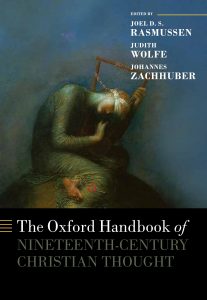Through various realignments beginning in the Revolutionary era and continuing across the nineteenth century, Christianity not only endured as a vital intellectual tradition, but also contributed importantly to a wide variety of significant conversations, movements, and social transformations across the diverse spheres of intellectual, cultural, and social history. The Oxford Handbook of Nineteenth-Century Christian Thought proposes new readings of the diverse sites and variegated role of the Christian intellectual tradition across what has come to be called ‘the long nineteenth century’. It represents the first comprehensive examination of a picture emerging from the twin recognition of Christianity’s abiding intellectual influence and its radical transformation and diversification under the influence of the forces of modernity.
List of contributors
Introduction, Joel D. S. Rasmussen, Judith Wolfe, and Johannes Zachhuber
Part I: Changing Paradigms
1: The Transformation of Metaphysics, Joel D. S. Rasmussen
2: Political Transformations, Mark Chapman
3: The History Turn, Johannes Zachhuber
4: Criticism and Authority, David Lincicum
5: The Science of Life, Donovan O. Schaefer
Part II: Human Nature and the Nature of Religion
6: Immanence and Transcendence, Merold Westphal
7: Selfhood and Relationality, Jacqueline Mariña
8: Gender, Lori Pearson
9: Faith and Reason, Russell Re Manning
10: Experience, Simeon Zahl
11: Myth, George S. Williamson
12: Virtue and Character, Paul Martens
Part III: Culture and Society
13: State and Church, Ian Tregenza
14: The Nation and Nationalism, Halvor Moxnes
15: Capitalism and Socialism, Philip Lockley
16: Mission and Colonialism, Michael Gladwin
17: Education and Its Institutions, Zachary Purvis
18: Recreation and Leisure, Paul Heintzman
19: Other Religions, Bernhard Maier
20: Race and Emancipation, Martin Halliwell
21: The Natural World, Malcolm Clemens Young
22: War, James Turner Johnson
Part IV: Christianity and the Arts
23: The Novel, Andrew Tate
24: Poetry, Rosalind Powell
25: Theatre, Linzy Brady and Jolyon Mitchell
26: Painting, George Pattison
27: Music, Bennett Zon
28: Architecture, William Whyte
Part V: Christianity and Christianities
29: Roman Catholicism, Daniel Menozzi
30: Protestantism, Annette G. Aubert
31: Anglicanism, Frances Knight
32: Orthodoxy, Norman Russell
33: Christian Minorities, Peter Lineham
Part VI: Doctrinal Themes
34: God, Richard H. Roberts
35: Christ, Robert Morgan
36: Church, Shao Kai Tseng
37: Scripture, William J. Abraham
38: Sin and Reconciliation, Paul T Nimmo
39: Life in the Spirit, Peter C. Hodgson
40: Eschatology, Judith Wolfe
 The Oxford Handbook of Nineteenth-Century Christian Thought, published in June 2017, is the result of five years of collaborative work led by J. Rasmussen, J. Wolfe and J. Zachhuber.
The Oxford Handbook of Nineteenth-Century Christian Thought, published in June 2017, is the result of five years of collaborative work led by J. Rasmussen, J. Wolfe and J. Zachhuber.